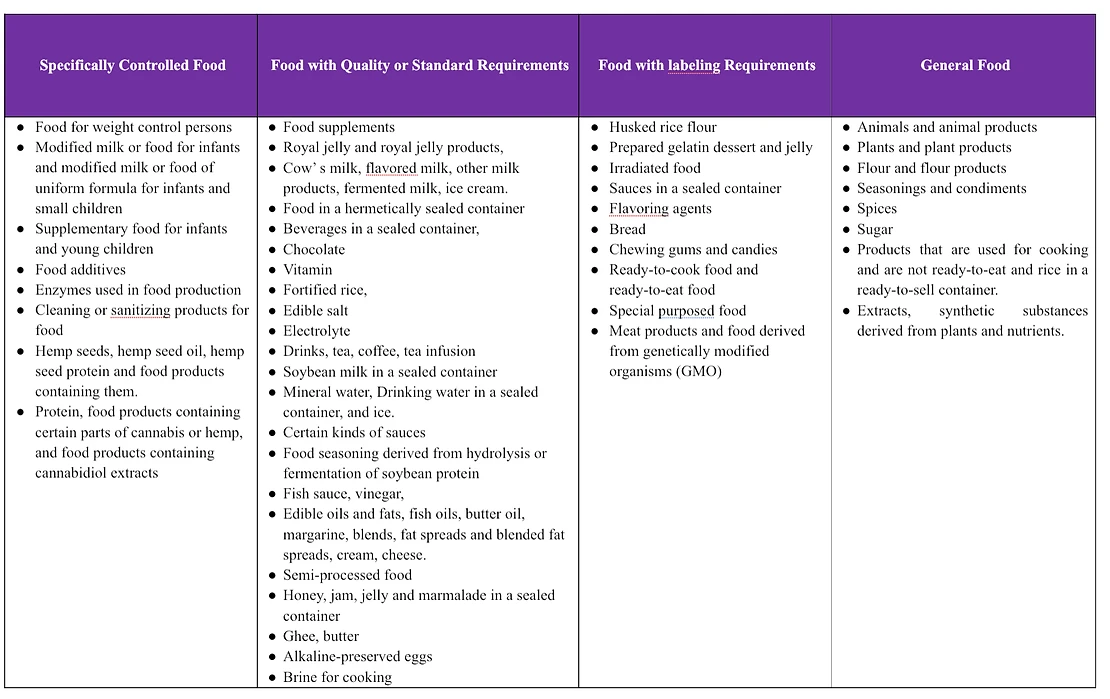Thailand’s Ministry of Public Health and the Thai FDA handle most of the food regulation work. They keep an eye on what’s produced or imported and whether it meets safety standards. Here, “food” covers a lot of things—from what people eat to the ingredients that go into making it, like flavours and additives. Drugs and controlled substances are the only exceptions.
Now let’s break down how food is classified and what approvals companies need to get their nutritional product registered in Thailand.
Categorization of Food Products in Thailand
Food classification in Thailand encompasses four distinct categories for the purpose of regulation and oversight:
- Specifically Controlled Food
- Food with Quality or Standard Requirements
- Food with Labeling Requirements
- General Food
The “General Food,” comprises food items not falling within the first three categories and is typically used as raw materials in food production or cooking. Unlike categories 1 to 3, general food in category 4 is not mandated to undergo registration and obtain a food serial number before production or importation. However, if such food has been registered and obtained a food serial number, proper labeling is required.
When general food is contained within a hermetically sealed container, such as a metal can, a glass bottle with metal lids and rubber seals, or a plastic container with an aluminum foil layer, it is classified as “food in a hermetically sealed container” and must adhere to the relevant regulations.
For support with regulatory approvals for nutrition, health, and dietary supplements in Thailand, explore our Nutrition Product Regulatory Affairs Services.
Regulatory Approvals and Permissions for Food Products in Thailand
Regulatory approvals and permissions for food in Thailand entail varying requirements for domestic manufacturers and importers. The process to acquire the necessary food permissions involves two key steps:
Food Premises License
There are two distinct types of food premises licenses issued by the Thai Food and Drug Administration – one for domestic food production and another for the importation of food products into Thailand.
Food Importation Premise: Importers must apply for a license specifically for importation. Successful applicants will be granted a “License for Importation or Ordering of Food into the Kingdom.”
Food Production Premise: Food producers must apply for a license for food production. The type of license issued depends on whether the food production premises are categorized as a factory or not. If the premises qualify as a factory, the licensee will receive a “License for Food Production.” If not recognized as a factory, a certificate specifying the number of the food production premises is provided.
Food Product License
Companies looking to sell food products in Thailand must obtain relevant food licenses and a unique Food Serial Number. The Thai FDA issues different types of food licenses –
- Certificate of Food Recipe Registration
- Certificate of Food Label Permit
- Certificate of Food Registration
- Certificate of Food Detail Declaration
Regulatory Process for Food Licensing
To obtain food licenses, the applicant must be an individual or a legal entity with a commercial registration certificate and a business presence in Thailand. Both importers and food producers can submit their applications online via the Food e-Submission System. Applicants using the Food e-Submission System need to log in through the e-Authentication System or Open ID System, which can be accessed at https://accounts.egov.go.th/. It’s important to note that the application forms and the submission system are in the Thai language, which might pose challenges for foreign manufacturers. Therefore, it is advisable to engage with regulatory consulting firms with expertise in Thai food regulations, such as Artixio, to facilitate the registration process.
Reach out to us for Thai FDA Food Supplements License Consulting today!
Thai FDAs GMP Requirements for Food Products
Good Manufacturing Practices (GMP) regulations establish fundamental criteria and prerequisites for food production to ensure food safety. These rules are primarily designed to prevent and mitigate risks associated with foodborne illnesses, hazards, and unsafe conditions, making compliance mandatory for producers. The GMP rules apply to all food production facilities producing items for sale, with a few exceptions:
- Private establishments preparing food for immediate consumption at dining areas or for takeout, except for the production of specific food categories with machinery totaling at least 5 horsepower or equivalent or employing a minimum of 7 workers.
- Food-selling or vending establishments in public areas, including food hawkers and stalls.
- Premises involved in edible salt production, which must adhere to the relevant Ministerial Regulation and the Ministry of Public Health’s notifications.
- Facilities engaged in sorting and packing specific fresh vegetables and fruits, regulated under the Ministry of Public Health’s Notification which covers production processes, equipment, utensils, storage practices, and labeling.
The GMP requirements encompass five key sections including Location, Production Building, Cleaning, and Maintenance; Equipment, Machines, Utensils, Production Tools, Cleaning, and Maintenance; Process Control; Sanitation and Personal Hygiene.
Navigating the complex regulatory landscape of Thailand’s food industry requires a deep understanding of the local regulations, licensing processes, and Good Manufacturing Practices (GMP) compliance. Whether you are a domestic manufacturer or an importer, adhering to these regulations is essential to ensure the safety and quality of food products in the Thai market. Given the language barriers and intricate procedures involved, seeking professional assistance is highly recommended.
Artixio, with its expertise in Thai food regulations and extensive experience in regulatory services, can be your trusted partner in simplifying the regulatory journey. Contact Artixio today to streamline your path to compliance and successful market entry in Thailand’s thriving food industry. Your success begins with Artixio’s regulatory services.


